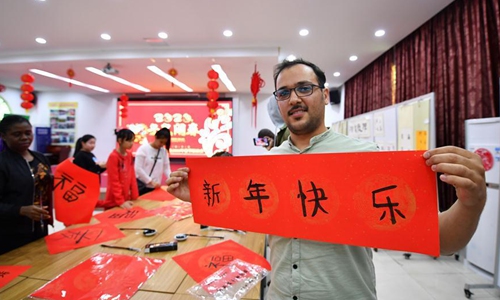Hard-working international students keep learning online despite time difference
By Chen Xi Source:Global Times Published: 2020/3/11 22:58:40 Last Updated: 2020/3/11 14:58:40

A Yemeni student shows his Chinese calligraphy work in Hainan University in Haikou, capital of south China's Hainan Province, Jan. 22, 2020. Some 60 international students on Wednesday attended the cultural event to greet the Chinese Lunar New Year. (Xinhua/Guo Cheng)
International students studying at Chinese schools are showing their hard-working attitude and strong eagerness for pursing knowledge amid COVID-19 as some of them have to deal with time difference problems from taking online courses in their mother countries.The new semester of Chinese schools was supposed to start on February 17 but was postponed due to the outbreak of the deadly novel coronavirus. Many teachers have begun to use the method of online teaching including live streaming and recorded audio for teaching their students. Although it helps students to catch up, the course schedule causes some trouble for overseas students.
Different choices
A postgraduate surnamed Sayed from Egypt who studies at Beijing Normal University told the Global Times on Wednesday that she has to get up at 3 am to have her online class.
"I am not able to chat with my family since my current schedule is completely opposite with them. I need to sleep during the day and have online classes at night, which makes me feel uncomfortable. I can learn by watching the playback of the recorded audio, but I prefer to join in the live streaming course," Sayed said.
Lena, a Ukrainian studying at Peking University, told the Global Times that she is also in favor of the live streaming class as she can have more interaction with the teachers.
But some overseas students choose the recorded lessons as they think it is more convenient and creates less pressure from the time difference problem.
Maxime Houben, a French student studying international relations and international business at the University of Nottingham Ningbo China, told the Global Times on Wednesday that she started to learn through the audio recorded course, powerpoints and some learning apps.
"I do it whenever I have time and some calmness and serenity. What is difficult is the time difference with China and with other students, which makes group work difficult to handle," she said, adding that she hoped to get back to normal campus life soon.
Christian from Germany, who also studies at the University of Nottingham Ningbo China, told the Global Times on Wednesday their new semester has been postponed from February 12 to March 2, and their lectures have been canceled and converted to online lectures. "Since the online lectures are always available, this is not a problem for me," he said.
Rational adjustment
According to Nuria, a postgraduate from Kyrgyzstan who studies Teaching Chinese to Speakers of Other Languages at East China Normal University, teachers try to communicate with the students and adjust the time according to the situation of the students. "We have a class which would begin at 5 am Russian time, but our teacher changed the time to 1 pm Russian time, for which I feel very grateful," he said.
Nuria added that although she prefers to have a face-to-face class, online courses have some benefits as well since she has learnt how to use different learning apps, which will be helpful in her future career as a teacher.
Phonthip Sawat from Thailand, who is studying at East China Normal University, told the Global Times that they have a class which begins at 8 am. Their teachers allow the students in different time zones to sign up later while those in China, Thailand, South Korea, Japan and Singapore need to sign up online on time.
To cater to international students' needs caused by time difference, a professor, who wished to remain anonymous, at Tianjin Foreign Studies University, told the Global Times that she switched class schedule from 2 pm to 4 pm so that three international students in Zambia, Morocco and Mongolia can have the class at 10 am, 9 am and 4 pm, when remaining in home countries.
She added that she needs to make phone calls the first thing every morning to two of her international students who are currently living in Tianjin at the moment, and then report their physical condition and their possible living difficulties to the university's international cooperation and exchange office.
"A Nigerian student once reported that he was running out of facial masks, and school's staff drove to his apartment and sent him some masks," she said.
International students who flew to their mother countries during the Chinese New Year did not suspect they would not be able to come back to China due to their flights being canceled amid COVID-19. They all hope the epidemic will be over soon and that they can come back and continue their studies as normal.
"This whole situation is quite exceptional, and even though I am struggling with my current situation, I believe that we are all doing our best to make this work," Houben said.
Posted in: RELATIONSHIPS,CULTURE & LEISURE,ARTS FOCUS